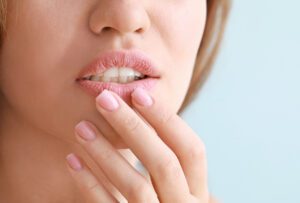An increased likelihood of chapped lips is associated with dry weather. Moisturizer and proper hydration can be beneficial. Chapped lips can also be caused by other conditions, such as vitamin and water deficiency.
Several things can lead to chapped lips, such as:
weather
excessive lip-licking
In general, dry lips can be treated with over-the-counter medications and preventative measures. If your lips remain dry and chapped, it is advisable to seek the advice of a dermatologist.

Why do lips crack?
Unlike other areas of the skin, the lips do not have sebaceous glands. This suggests that the lips are more prone to dehydration and cracking. Whether the problem is caused by the weather or stems from a lack of self-care, a lack of moisture can make it worse.
Chapped lips appear in winter when there is less humidity. Regular exposure to the sun in summer can also make your problem worse.
Frequent licking is another common cause of chapped lips. The saliva of the tongue can further dehydrate the lips, making them even more thirsty.
How to care for chapped lips and how to avoid them
Most of the time, cracked lips can be treated at home. Ensuring your lips are adequately moisturized is the first step. To do this, you can:
Wear a scarf or lip balm throughout the day, drink more water, use a humidifier at home, and avoid cold weather
Chapped lips can also be a result of sun exposure, especially with age. Before going outside, use a lip balm with at least SPF 15. While sunscreen helps prevent further drying effects, lip balm helps hydrate your lips.
Prevention of chapped lips
Avoid licking. Your lips will be drier just by licking them. Liquid saliva evaporates quickly, leaving your lips drier than before.
Avoid using flavored lip balms. You are tempted to lick things that taste good on your lips. Flavored lip balms can be fun, but they can also cause dry, cracked lips, which isn’t nice.
Cover your mouth when exposed to the elements. Cold air can dry out the lips. When you go outside in freezing weather, wearing a scarf can help protect them.
Avoid contact with allergies. You may have delicate lips irritated by perfumes, colors, or fragrances. Therefore, keep these cosmetics and products containing ingredients out of the mouth.
Eat and drink plenty of water. Since the winter air can be dry, use a humidifier to keep the air in your home moist. Drink plenty of water to prevent dehydration, which can cause dry lips and skin.